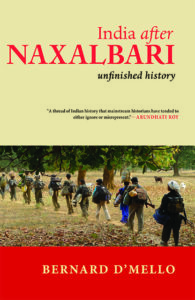India after Naxalbari: Unfinished History
REVIEWS, 10 Sep 2018
Bernard D’Mello | Monthly Review – TRANSCEND Media Service
Publication Date: Sep 2018
Although the 1967 revolutionary armed peasant uprising in Naxalbari, at the foot of the Indian Himalayas, was brutally crushed, the insurgency gained new life elsewhere in India. In fact, this revolt has turned out to be the world’s longest-running “people’s war,” and Naxalbari has come to stand for the road to revolution in India. What has gone into the making of this protracted Maoist resistance? Bernard D’Mello’s fascinating narrative answers this question by tracing the circumstances that gave rise to India’s “1968” decade of revolutionary humanism and those that led to the triumph of the “1989” era of appallingly unequal growth condoned by Hindutva-nationalism, the Indian variant of Nazism.
 Will what remains of India’s continuing “1968” bring twenty-first-century “New Democracy” to the collective agenda? Or will the ongoing regression of “1989” lead the way to full-blown semi-fascism and sub-imperialism? India after Naxalbari is far more than a simple history of the ongoing Naxalite/Maoist resistance; it is a deeply passionate and informed work that not only captures the essence of modern Indian history but also tries to comprehend the present in the context of that history—so that the oppressed can exercise their power to influence its shape and outcome.
Will what remains of India’s continuing “1968” bring twenty-first-century “New Democracy” to the collective agenda? Or will the ongoing regression of “1989” lead the way to full-blown semi-fascism and sub-imperialism? India after Naxalbari is far more than a simple history of the ongoing Naxalite/Maoist resistance; it is a deeply passionate and informed work that not only captures the essence of modern Indian history but also tries to comprehend the present in the context of that history—so that the oppressed can exercise their power to influence its shape and outcome.
India After Naxalbari is about a thread of Indian history that mainstream historians have tended to either ignore or misrepresent. This account puts it squarely into our history books.
—Arundhati Roy, author, The Ministry of Utmost Happiness
The armed rebellion of poor peasants that began fifty years ago in Naxalbari, India, continues to this day. Bernard D’Mello sets out the story of its origins and uneven development, in historical context. The armed struggle lives on because the conditions that gave rise to it not only persist, but are yet more severe. To understand the present and future of India, this story is essential. And Bernard D’Mello’s brilliant account has no equal.
—John Mage, International Lawyer
Drawn upon a vast range of both empirical findings and archival records, as well as past theories of revolution, this book is a major contribution, not only to the literature of the Naxalite movement and its present Maoist phase in India, but also to the current global academic debate over the wider issue of armed struggle against state oppression. Firmly based on his feet—one foot on his own personal experiences, and the other on his theoretical grounding—D’Mello believes that the ‘unfinished history’ of the Naxalite movement will continue, acquiring new forms of resistance against the present ruling order in India, which is an ugly and cruel mélange of the US-fashioned model of neoliberal economy and the BJP-led pattern of Hindu fascism—a phenomenon which Bernard D’Mello conceptualizes as ‘sub-imperialism,’ with India as a junior partner in the camp. His scintillating theoretical observations are lit up by the human warmth of quotes from revolutionary poets, with which he introduces every chapter.
—Sumanta Banerjee, independent researcher of left politics and popular culture; author, In The Wake of Naxalbari and The Parlour and the Streets: Elite and Popular Culture in Nineteenth Century Calcutta
This book is not just a history of Maoism in India. It is a comprehensive, analytical, well-researched and searing critique from the movement’s point of view of the entire facade of liberal democracy which cloaks the myriad exploitations of India’s ruling classes. D’Mello has reminded us that the most ignored voice in the crowd is the one that shouts, ‘But the emperor has no clothes!’
—Partha Chatterjee, Professor of Anthropology, Columbia University, New York
_____________________________________________
Bernard D’Mello is a senior journalist with the Economic & Political Weekly and a civil rights activist with the Committee for the Protection of Democratic Rights, Mumbai. Among his written works is, What Is Maoism and Other Essays.
Go to Original – monthlyreview.org
DISCLAIMER: The statements, views and opinions expressed in pieces republished here are solely those of the authors and do not necessarily represent those of TMS. In accordance with title 17 U.S.C. section 107, this material is distributed without profit to those who have expressed a prior interest in receiving the included information for research and educational purposes. TMS has no affiliation whatsoever with the originator of this article nor is TMS endorsed or sponsored by the originator. “GO TO ORIGINAL” links are provided as a convenience to our readers and allow for verification of authenticity. However, as originating pages are often updated by their originating host sites, the versions posted may not match the versions our readers view when clicking the “GO TO ORIGINAL” links. This site contains copyrighted material the use of which has not always been specifically authorized by the copyright owner. We are making such material available in our efforts to advance understanding of environmental, political, human rights, economic, democracy, scientific, and social justice issues, etc. We believe this constitutes a ‘fair use’ of any such copyrighted material as provided for in section 107 of the US Copyright Law. In accordance with Title 17 U.S.C. Section 107, the material on this site is distributed without profit to those who have expressed a prior interest in receiving the included information for research and educational purposes. For more information go to: http://www.law.cornell.edu/uscode/17/107.shtml. If you wish to use copyrighted material from this site for purposes of your own that go beyond ‘fair use’, you must obtain permission from the copyright owner.